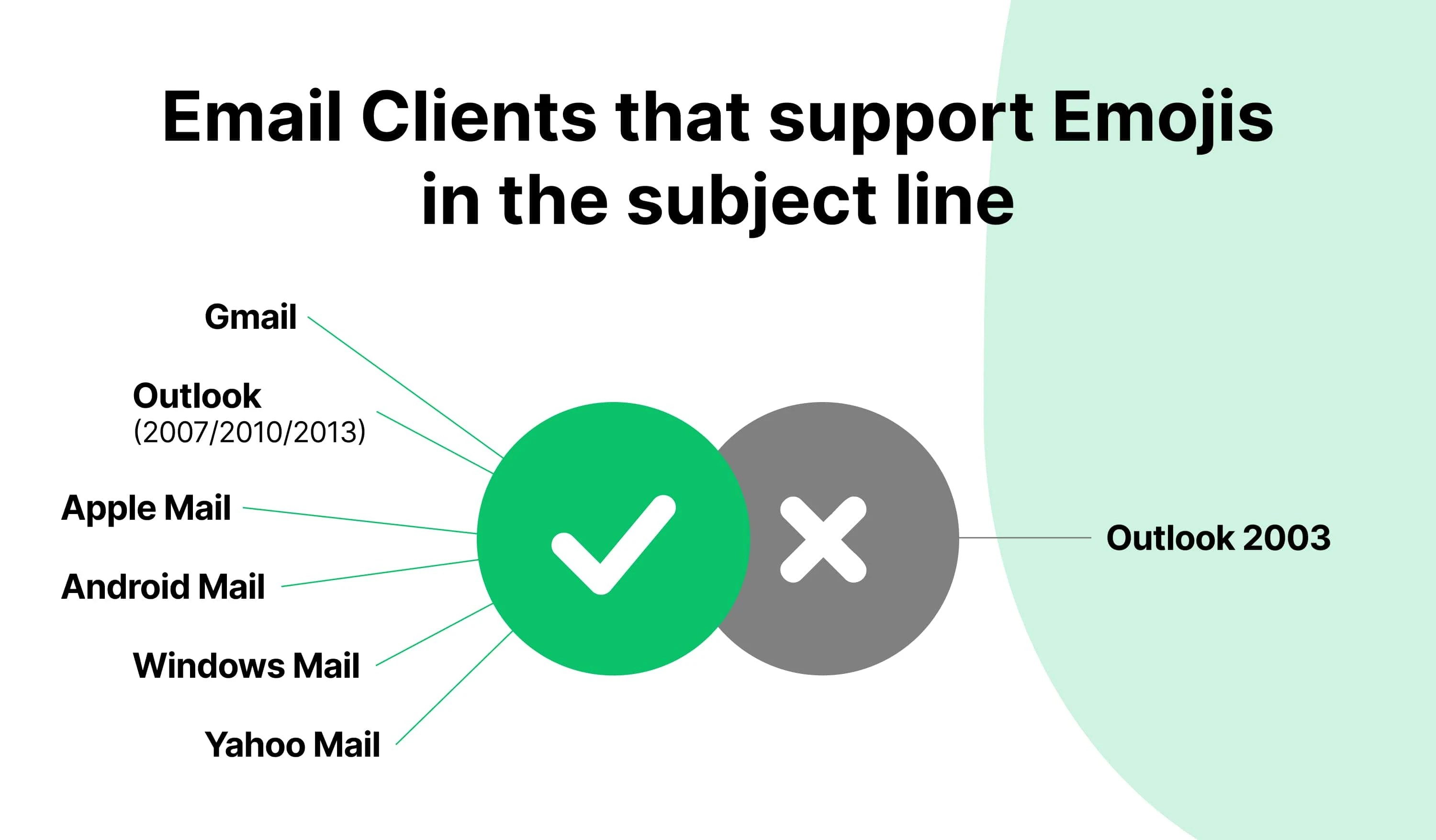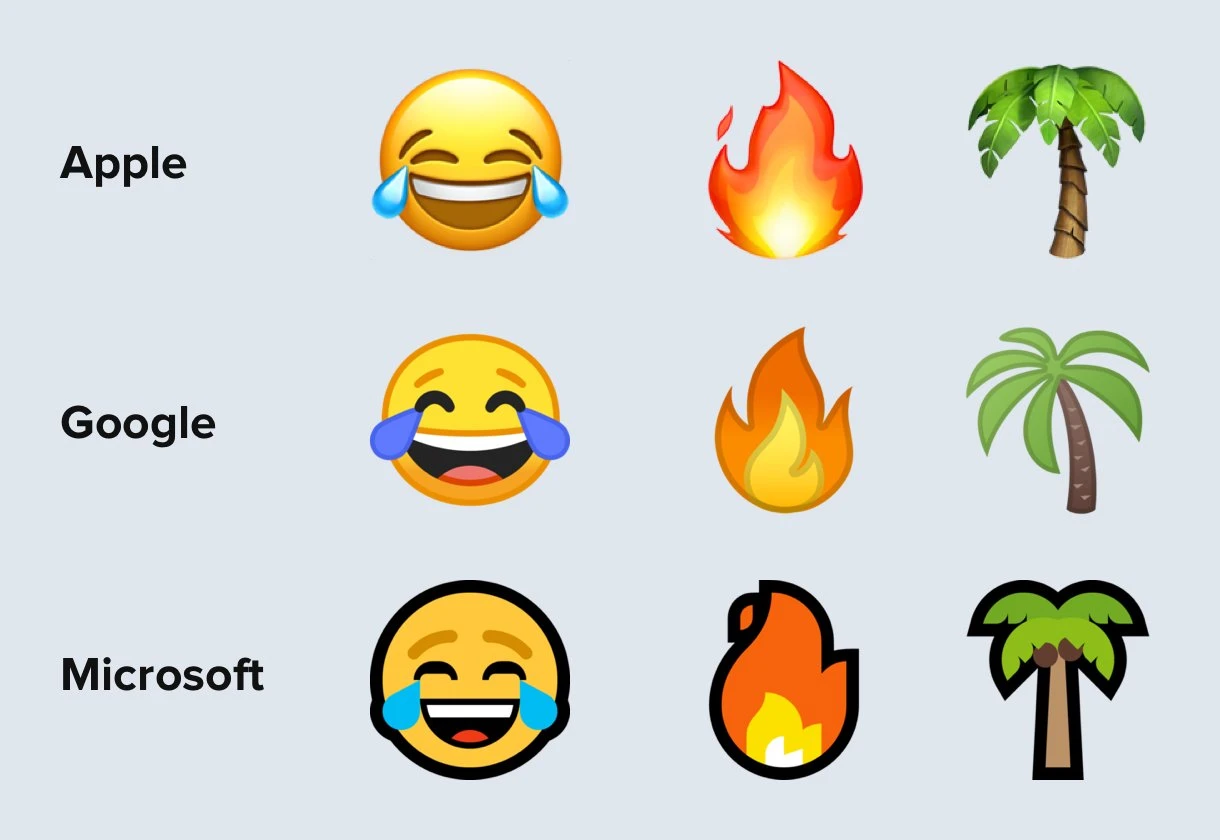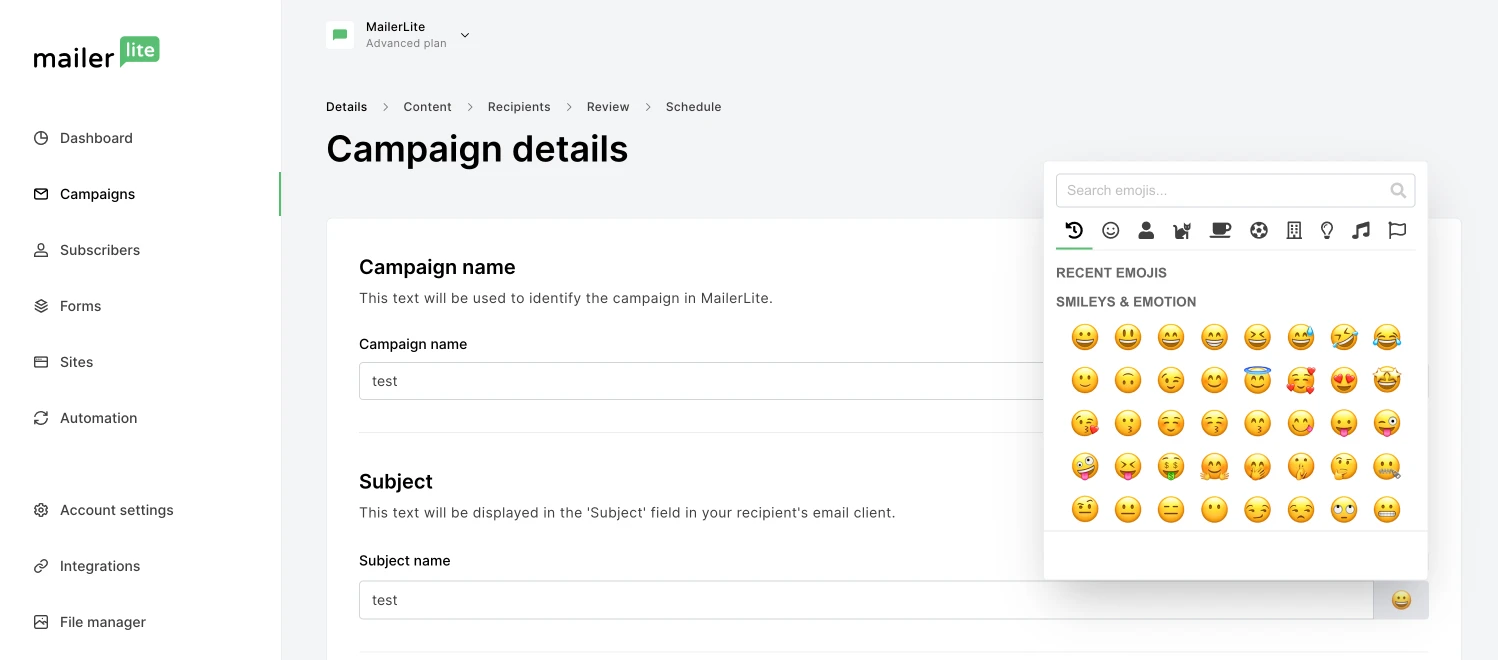The complete guide to using email emojis in subject lines
 Izabella, HR Manager (left) and Amer, SEO manager (right)
Izabella, HR Manager (left) and Amer, SEO manager (right)
The popularity and use of emojis changes with each generation—which leaves email marketers like us scratching our heads and asking the same question.
Should I use emojis in subject lines?
Well… it depends.
We’ll weigh up the pros and cons so you can determine if emojis are right for your audience. Plus I’ll show you some inspiring examples, stats on how emojis affect open rates, and best practices to help you do emojis right.
Me: 🤜
You: 🤛
Us: 💥
Should I use emojis in my subject line? (hint: it’s easy to find out)
In some industries, emojis are a total hit. As research and testing have shown, emojis can:
Get you higher open rates
Increase click-through rates
Make emails stand out in an inbox that mostly contains hues of grey, white and black
Replace entire words, saving you space to communicate more with fewer characters
Help convey a mood or reinforce a message and its meaning
Give your brand personality
Be inserted and used easily
On the other hand, emojis can also make your message seem less serious and decrease your open rate if you miss the mark with your target audience.
As you can tell, the answer to emojis isn’t crystal clear.
Overall the research is conflicted, but general trends suggest that:
When your business deals with serious or important matters, an emoji can take away the professionalism from your message
Overuse of emojis in one subject line can trigger spam filters and harm your email deliverability
If the reader doesn’t know your brand, your email can come across as a mass marketing message
Since some emojis can be interpreted differently, your message can end up confusing readers
Likeability: 67% of people agree that using emojis makes you seem friendlier, funnier or cooler
Professionalism: 39% of senior managers think that emojis are unprofessional
Different audiences: While 68% of millennials are happy to express themselves with emojis, only 37% of people over the age of 65 feel the same way
Standing out: In a 2020 study, 33% of participants clicked on emoji subject lines, while 9% clicked on non-emoji emails (the other 58% didn’t select any emails)
The effect of emojis on open rates
The impact of emojis isn’t universal, it all depends on your business and target audience.
We looked at 48 industries and compared the open rates of newsletters that included emojis in subject lines versus those that did not. There are always other factors that can affect open rates, such as clarity, relevance, email list quality, etc. But, the data does provide some interesting insight.
For some industries, such as health and fitness or online courses, the difference is negligible (less than a 1% change in open rates). Whereas other industries, like educational institutions, saw an increase in open rates of over 6%.
| Industry | Average open rate without emojis in subject lines | Average open rate with emojis in subject lines | Impact on open rates |
|---|---|---|---|
| Health and Fitness | 26.15% | 25.50% | -0.66% |
| Education and Training | 27.05% | 27.39% | +0.34% |
| Consulting | 21.89% | 24.09% | +2.20% |
| E-commerce | 20.01% | 18.42% | -1.58% |
| Media and Publishing | 26.28% | 21.77% | -4.51% |
| Non-Profit | 30.18% | 32.26% | +2.07% |
| Marketing and Advertising | 22.56% | 25.44% | +2.89% |
| Educational institution | 22.99% | 29.29% | +6.30% |
| Blogger | 29.88% | 34.18% | +4.31% |
| Author | 29.31% | 27.53% | -1.79% |
| Business and Finance | 21.07% | 25.03% | +3.96% |
| Religion | 30.40% | 32.13% | +1.72% |
| Arts and Artists | 24.89% | 27.94% | +3.04% |
| Retail | 26.38% | 18.20% | -8.18% |
| Travel and Transportation | 28.24% | 21.43% | -6.80% |
| Online courses | 21.92% | 21.80% | -0.12% |
| Coaching | 28.55% | 27.37% | -1.17% |
| Media | 29.53% | 28.25% | -1.29% |
| Entertainment and Events | 23.24% | 24.56% | +1.32% |
| Beauty and Personal Care | 19.45% | 16.96% | -2.49% |
| Creative Services | 25.55% | 28.32% | +2.77% |
| Sports | 27.98% | 26.91% | -1.07% |
| Software and Web App | 27.04% | 25.06% | -1.98% |
| Medical, Dental, and Healthcare | 20.86% | 24.83% | +3.96% |
| Real Estate | 27.12% | 19.15% | -7.96% |
| Publishing company | 29.22% | 23.87% | -5.34% |
| Hobbies | 25.72% | 26.36% | +0.64% |
| Music and Musicians | 26.02% | 22.55% | -3.46% |
| Agriculture and Food Services | 27.66% | 22.72% | -4.94% |
| Computers and Electronics | 21.70% | 31.12% | +9.42% |
| Home and Garden | 26.03% | 27.01% | +0.98% |
| Agency | 17.63% | 23.69% | +6.05% |
| Manufacturing | 19.74% | 23.80% | +4.07% |
| Photo and Video | 31.58% | 31.81% | +0.23% |
| Telecommunications | 30.61% | 19.14% | -11.47% |
| Government | 41.26% | 37.59% | -3.68% |
| Politics | 19.05% | 16.74% | -2.32% |
| Architecture and Construction | 23.69% | 24.15% | +0.46% |
| Restaurant | 28.50% | 25.25% | -3.25% |
| Legal | 24.59% | 20.23% | -4.36% |
| Finance | 31.13% | 36.32% | +5.19% |
| Recruitment and Staffing | 25.62% | 25.55% | -0.07% |
| Information Technology (IT) | 19.09% | 25.48% | +6.39% |
| Construction | 21.10% | 16.15% | -4.95% |
| Games | 21.49% | 17.34% | -4.15% |
| Higher Education | 26.51% | 32.98% | +6.46% |
| Insurance | 24.55% | 15.23% | -9.32% |
| Daily Deals/E-Coupons | 14.22% | 14.56% | +0.34% |
| Art gallery and museum | 28.23% | 33.95% | +5.72% |
If you’re interested in seeing more industry email marketing data, check out our 2022 Email Marketing Benchmarks.
As you can see, when asking “Should I use emojis in subject lines” it’s hard to provide one answer that applies to everybody—but it is easy to find out for yourself. You can use A/B testing to get an answer that’s right for your business.
Other variables like email list sizes and industry sample sizes affect this data. Rather than comparing your industry to others, find your industry and use the data, along with A/B testing, to guide you in finding out whether emojis could benefit your email marketing strategy.
How to A/B test emojis in your subject line
Your brand, email subject, audience, type of emoji, amount of emojis, etc—all of these factors play a part in the success of your emoji subject line. Since these factors are different for each company, it’s impossible to give a definite yes or no to the question of whether you should use emojis in your subject lines.
However, running regular A/B tests will get you an answer over time.
Remember to always change just one single element. First test one subject line with an emoji and one without. Then test different types of emojis. Then test the amount of emojis. Rinse and repeat until you start seeing a pattern of what does and doesn’t resonate with your audience.
We A/B tested emojis in subject lines ourselves and guess what? Emojis won. 🏆

Emojis vs. Email clients
How emojis appear in the inbox depends on the browsers, email clients and different devices your subscribers use. Different email clients and operating systems (iOS, Microsoft, Android, etc) render emojis differently, hence, a different outcome. How emojis are displayed on mobile depends on what the device supports.
General things to remember:
If a reader uses Gmail web clients, emojis are mostly shown in Gmail-style, regardless of the operating system (OS)
Most mobile devices display emojis without any issues
Subscribers that use Windows 8.1 or up will see your emojis (in color)
Most Mac laptop and desktop users will see emojis (supported from Mac OS X Lion (10.7) onwards)
Desktop and laptop users with Windows XP will not see emojis but emoticons or squares ▢

Outlook for Windows and Yahoo! Mail may show simplified black and white versions of emojis, while Gmail takes its own designed approach. Normally mobile devices adjust an emoji’s look to match their brand image.

Best practices on how to effectively use emojis
Though the power of emojis really depends on how your target audience reacts to them, there are some best practices to keep in mind when adding emojis to your email subject lines.
Don’t go all-in with your emojis
The more you use, the higher the chance that your emojis will affect your email deliverability or trigger spam filters. Don’t use emojis for click-bait efforts, use them sparingly and when they’ll enhance your subject line.
Though two emojis in a subject line won’t hurt your deliverability, do think about whether you need each emoji or if you can use a single one instead. Like in this example: ☀️ Summer is here ☀️.
The newsletter subject below doubles down on emojis by using emojis in their subject and preheader. At first glance, it’s hard to grasp what the email is about. Using this many emojis can either work to your advantage or disadvantage. The answer is in the A/B test 🕵️♀️.

Know your audience
What's your audience like? Will they enjoy emojis or will they perceive your message as less serious? Does it fit the tone of the content inside the email?
If you have this information available, check to see what age range your audience is in. Do they use emojis? What types of emojis are appropriate?
A younger crowd might resonate more with emojis like 💁 , 🔥 and 😍 while an older audience engages better with 📈 and ✅. Or no emojis at all (depending on the age range).

Keep the emojis relevant
Add emojis because it makes sense, for example: 📈 How we grew our email list from 0 to 10,000.
This emoji is strengthening the message because it instantly indicates growth.
Use emojis when they are relevant to the content, not just because.

Say it without words
Though you don’t want to make it too hard on your readers by sending them mystery riddles, it can be fun to think out of the box and surprise readers every now and then with a subject line that uses emojis in a creative way.
For example, use different emojis to tell a creative story: ☕️ + 🍪 = $5.

Switch it up with different emojis
Surprise readers with an unconventional emoji. Have a look at your own inbox to see what popular emojis others are using and think of alternatives that you could use. Does everyone else use emoji faces? Maybe you can find emojis in other categories.

Tell a story
If you see that most of your audience uses an email client where preheaders are shown, you can play around and tell a story using the subject line and preheader.
Go for an all-emoji subject line like Chubbies or use the emoji to make your story more clear, like Torrid (both shown below).
Tip: It’s always a good idea to use a preheader, as preheaders can increase your open rate.

Examples of emojis in email subject lines
Makerpad - 👋 Welcome to Makerpad | Before you dive in…
Ryan at Animalz - 🥇 How to succeed as a content team of one, ft. Buffer, SaaStock, ChartHop
Native - [SAVE $5] Megan, celebrate our birthday with us! 🥳
Goodiebox - Baby, bye bye bye 👋🏼
Books Are Magic! - Must be books on the brain 💫
Mark Groves - Are You Codependent? 🙋🏻♂️ Me too.
Chrissy Teigen - My new favorite pasta 🌶
Too Good To Go - Save 🥘 🍣 and we´ll plant 🌳🌳| European Sustainable Development Week
Tara Reed - I'm hiring! AGAIN 🎉
Andy 👋 GMB Fitness - How the crow pose will make you better at everything
International Animal Rescue - A few ways YOU can help rescue captive bears 🐻
Steph at Clue - Bi the way…bisexuality isn’t a phase 🌈
Latest in Beauty - You haven't seen our new box! 😱
Curves - 👭 Hi, exercise is more fun with friends!
Red Cap Cards - Summer Greetings 💛
Fair Trade Winds - 💭 Thursday thoughts: Gardening 🥕
Want to learn how to write an attention-grabbing subject line? Check out the guide below:
How to add emojis to your email subject lines in MailerLite
When you’re using MailerLite, adding emojis to your subject line is super duper easy. You don’t need to go to any online emojipedia and start copy/pasting the right emoji, instead just click on the 😀 emoji in the subject line field. This automatically opens an emoji keyboard.

Our emoji keyboard is available for all subject line fields. If you want to quickly add emojis to your email content in the newsletter editor, install an add-on like Emoji Keyboard (Chrome and Firefox) or Joypixels (Chrome and Opera). This way you’ll always have an emoji keyboard available in your browser.
Say it with a smiley face
Whether or not to use emojis really depends on your brand. If your audience resonates with emojis in your email campaigns, it can definitely increase the open and click-through rate. Emojis can also backfire and make your message less serious, come across as marketing or appear off-brand. The rule of thumb is: Only add an emoji if it adds to your subject line, not just because.
To find out how your newsletter subscribers react, you can A/B test emoji use and analyze your findings over time.
Will you start testing emojis? Let us know your findings in the comments!
Editor's note: This article was originally published in July 2020, and has now been updated with some new statistics.


